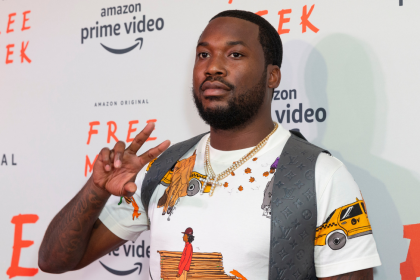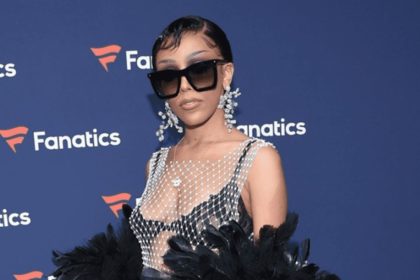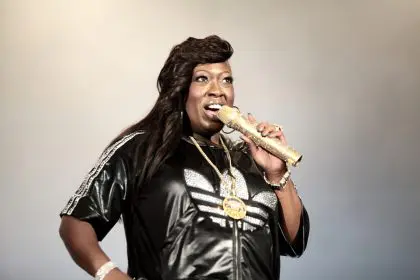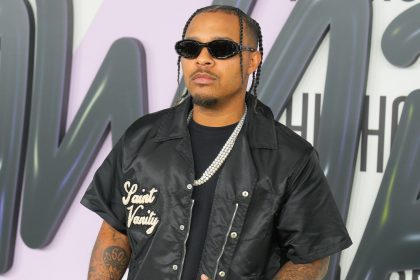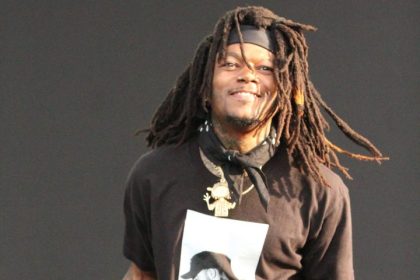
Maurice Mobetta Brown doesn’t believe in genre boundaries. The Grammy Award-winning trumpeter has built a career that seamlessly flows from jazz stages to hip-hop studios, from performing with Silk Sonic to producing records with J. Ivy. Now, with five albums sitting in his vault and a new jazz club opening in Indonesia, Brown represents a new generation of musicians who refuse to be boxed in.
The Chicago native’s journey began not with a trumpet, but with a guitar under the tutelage of his uncle, blues musician Bobby “Slim” James. When fifth grade brought the opportunity to choose an instrument, Brown discovered his natural affinity for the trumpet — though it would take years of disciplined practice, informed by his third-degree black belt in Taekwondo, to transform that raw talent into mastery.
Brown’s approach to the trumpet is uniquely his own. “I approach the music more from a vocal standpoint,” he explains, describing how he imagines himself singing or rapping through his horn. This philosophy has carried him from the jazz clubs of New Orleans — where he breathed the same air as Louis Armstrong — to world stages with Anderson Paak and Bruno Mars.
His upcoming album, Betta Days, (releasing Aug. 29) promises to be a celebration of life featuring collaborations with MonoNeon, Kamasi Washington and others. The first single “Free” drops June 20, offering what Brown calls a necessary message for these times: the importance of staying focused and free in turbulent political climates.
When did you realize that the trumpet was your voice?
Well, my introduction to music. I started playing trumpet when I was in fifth grade. That’s when they introduced you to all the instruments, and said, “You know, pick an instrument in the room you wanted to play.” And I was a natural at trumpet, so I kind of just stuck with that. Before the trumpet, I was playing guitar a little bit. My uncle is a pretty well known blues guitarist and singer, Bobby Lynn James. So I used to play on his gigs. [I would] go play guitar with him, and he used to teach me that. So, my first instrument wasn’t a trumpet. It was actually guitar.
How have Chicago and Mississippi shaped your sound?
Chicago and New Orleans connected with the Mississippi River. Of course, that’s a big part of my sound, because once I went down the Mississippi River and went to New Orleans and got a hold of all that, and started breathing the same air as, you know, Louis Armstrong and other great trumpeters, Wynton Marsalis and Nicholas Payton.
That’s when I realized, like, “You know, man, I really might have something special,” because people really gravitated to the way I played. And I was having shows, and they were packing out. And I didn’t take that lightly because I wasn’t a local. Usually they just support the locals, you know.
What was your “I made it” moment in the industry?
It’s funny that you asked me that because somebody recently just asked me that, you know, “When was the moment that you knew that you made it?” I feel like I’m so busy all the time just doing so much great stuff that, that moment gets topped every other day, you know, just by living.
But I [can] think one of the pinnacles of my career [was] probably [being] a part of Silk Sonic. That was really great with Anderson .Paak and Bruno Mars. So I really … that was amazing. But like I said, I’m always doing something that’s over the top that just always tops the list every day, you know.
What inspired you to blur genre lines between jazz, hip-hop and soul?
I think what inspired me to kind of blur the genre lines was just being authentic. I really just make music that I like, and those are the genres that I [draw from] the most [or am] most heavily influenced by. So when I write music, I’m just pulling from all that naturally. I’m not trying to do it. It’s just how I hear music.
What’s the biggest difference between performing with groups like Silk Sonic versus working solo?
The biggest difference is, well, first of all, it’s less of a responsibility on my end. All I got to do is show up and play trumpet. That’s awesome. [When] it’s my gig, I’m responsible for everybody else that’s working with me and the band, making sure that their well-being is taken care of, and everyone’s comfortable, and everyone’s getting paid. And it’s just a lot more responsibilities. That’s the biggest difference.
What’s the hardest lesson you’ve learned on your journey as an artist?
I think the hardest lesson I’ve learned on my journey as an artist is to take the good with the bad, you know. Like you said, I’ve been in this industry, and I’ve had some highs, and I’ve had some lows, and neither of those define you, so you can’t get too caught up in your successes or in your failures.
You got to just keep it moving and learn from everything. Everything’s a learning lesson, and that’s how I look at life; I just do the best I [can] do. Give 110% every day. The only person I’m in competition with is myself when I look in the mirror, you know, so I just got to be better than I was yesterday. [That’s] an improvement to me.
How would you describe your playing style?
I would describe my playing style as very seductive, soulful, honest, fun, joyful and direct. Clarity, you know. I have a lot of clarity, and I also try to play … what I think … what makes my style really special and a lot different from most trumpeters is that I approach the music more from a vocal standpoint. So I try, in my mind, I’m hearing it when I’m playing. I’m hearing like I’m singing like a singer, like a vocalist, or like I’m rapping.
That’s my delivery when I’m playing the trumpet. That’s my attitude. And I think it comes out that way. Really the listeners really connect to it and understand what I’m trying to say or convey at the moment, you know.
What’s one thing you wish more people understood about the life of a working musician?
One thing I wish that people would understand more about the life of a working musician is that, you know, people think it’s like, “Oh, you’re just having fun. You’re traveling all over the world, and you know, you don’t have a care in the world,” and it’s actually the opposite of that. Like, I’m definitely having fun doing what I’m doing, and it’s a blessing to be able to, you know, make a living doing what you love to do.
But to be steady[ly] uprooted from your place of your sanctuary, your home, where you recharge at, you know, like to not be able to do that often is a give [and] take, you know. So you have to … you have to choose which one you want. For me, personally, I’m okay at this time in my life to be not home like that. Last year, I was home for three and a half weeks the whole year.
The year before, it was four weeks the whole year, you know, and this year is not much different so far. So I’m just … you know, like I said, I’m grateful, and I’ve always believed in, “Take care of the music and the music [will] take care of you.”
How do you take care of yourself when you’re not making music?
I mean, as far as self-care, I try to get into some meditation as much as I can. I was trained in meditation because I’m a black belt, third-degree black belt in Taekwondo. So I meditate often, and coming up, I [used it and it] definitely helped me a lot to be self-disciplined in order to like, get to the root of this instrument and this music, to try to understand it better, to be patient with myself, and just to know that, the more I practice it, the better it would get.
So, even though I was a natural, it’s still like once I started practicing, that’s when everything went to another level, because I was taking it for granted that trumpet was easy for me as far as like making a note or conveying a feeling through it. But once I realized there [were] other things I needed to do—you know, I had weaknesses that I wasn’t practicing. So I started practicing on my weaknesses, and that’s when I got better. Like I could tell. I could feel and hear the difference, you know.
Why is Black music more important now in these times than ever?
Well, I feel like Black music is more important in these times than ever, because, historically speaking, Black music has always been the music of the people, the music of the streets. The griots of the streets would tell the tale of what was going on, and when people were at their lowest, we would always have certain entertainers come to make certain songs that give us the theme song, to give us the confidence and the steam to rise to the occasion.
And I feel like that’s what we need right now. And that’s pretty much the mission right now. My single is entitled “Free.” And that’s basically what it’s talking about; you got to be free to be what you want to be and just stay focused. And don’t listen to the riffraff, the rigmarole. Just keep it moving, and I think you’re bound to have great, great outcome if you stay focused. Don’t get distracted.

